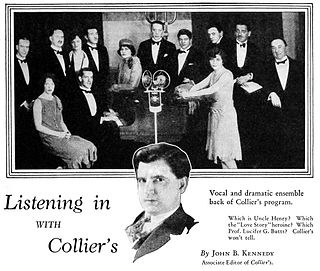The Magic Key of RCA was an American variety radio show that featured an unusually large and broad range of entertainment stars and other noted personalities. It was on the NBC Blue Network from September 29, 1935, until September 18, 1939.

The Blue Network was the on-air name of the now defunct American radio network, which ran from 1927 to 1945. Beginning as one of the two radio networks owned by the National Broadcasting Company (NBC), the independent Blue Network was born of a divestiture in 1942, arising from anti-trust litigation, and is the direct predecessor of the American Broadcasting Company (ABC)—organized 1943–1945 as a separate independent radio network and later TV broadcaster.
It was hosted by announcers Milton Cross and Ben Grauer, with a house orchestra directed by Frank Black through 1938 and Nathaniel Shilkret in 1939. [1] [2] [3] [4] [5]
Milton John Cross was an American radio announcer famous for his work on the NBC and ABC radio networks.

Benjamin Franklin Grauer was a US radio and TV personality, following a career during the 1920s as a child actor in films and on Broadway. He began his career as a child in David Warfield's production of The Return of Peter Grimm. Among his early credits were roles in films directed by D.W. Griffith.

Nathaniel Shilkret was an American composer, conductor, clarinetist, pianist, business executive, and music director.
Sies [3] says that, “NBC used this quality program to demonstrate the cultural contribution radio could make,” and notes that performers included Ruth Etting, Fibber McGee and Molly, John B. Kennedy, Rudolf Ganz, Casper Beardon, Paul Robeson, Eddie Green, Jane Froman, Doris Weston, Frank Forrest, Paul Taylor Chorus, Margaret Brill, Rudy Vallée, Irving Berlin, Darryl Zanuck, Jan Peerce, Tommy Dorsey, Artie Shaw, Jack Harris, Ann Jameson, Sonja Henie, Tyrone Power, Walter Abel, Whitney Bern and George Shelley. Dunning [1] writes that there were appearances by Amos 'n' Andy, Lum and Abner, Paul Whiteman, Efrem Zimbalist, Ignacy Jan Paderewski, Eleanor Roosevelt, Vienna Boys' Choir, Benny Goodman, Gladys Swarthout, Ray Noble, Guy Lombardo, Richard Himber, Eugene Ormandy, Lauritz Melchior, Fred MacMurray, Walt Disney and the Pickens Sisters. Dunning comments on the wide variety on the show by noting that programming included short dramas, a male quartet from Stockholm, jazz from Chicago, an account of Benito Mussolini's campaign in Africa and a conversation with a crew of a submerged submarine.

Ruth Etting was an American singing star and actress of the 1920s and 1930s, who had over 60 hit recordings and worked in stage, radio, and film. Known as "America's sweetheart of song", her signature tunes were "Shine On, Harvest Moon", "Ten Cents a Dance" and "Love Me or Leave Me". Her other popular recordings included "Button Up Your Overcoat", "Mean to Me", "Exactly Like You" and "Shaking the Blues Away".

Fibber McGee and Molly was an American radio comedy series. A staple of the NBC Red Network for the show's entire run and one of the most popular and enduring radio series of its time, the prime time situation comedy ran as a standalone series from 1935 to 1956, then continued as a short-form series as part of the weekend Monitor from 1957 to 1959. The title characters were created and portrayed by Jim and Marian Jordan, a real-life husband and wife team that had been working in radio since the 1920s.

John Bright Kennedy was an American radio correspondent, journalist, and film narrator.
A typical show in 1939 would begin with an opening number by Shilkret, followed by a comedy skit by Stoopnagle and Budd. [4] [5]

Stoopnagle and Budd were a popular radio comedy team of the 1930s, who are sometimes cited as forerunners of the Bob and Ray style of radio comedy. Along with Raymond Knight, they were radio's first satirists.
The complete set of broadcasts is available for listening at the Library of Congress.

The Library of Congress (LOC) is the research library that officially serves the United States Congress and is the de facto national library of the United States. It is the oldest federal cultural institution in the United States. The Library is housed in three buildings on Capitol Hill in Washington, D.C.; it also maintains the National Audio-Visual Conservation Center in Culpeper, Virginia. The Library's functions are overseen by the Librarian of Congress, and its buildings are maintained by the Architect of the Capitol. The Library of Congress has claims to be the largest library in the world. Its "collections are universal, not limited by subject, format, or national boundary, and include research materials from all parts of the world and in more than 450 languages."








